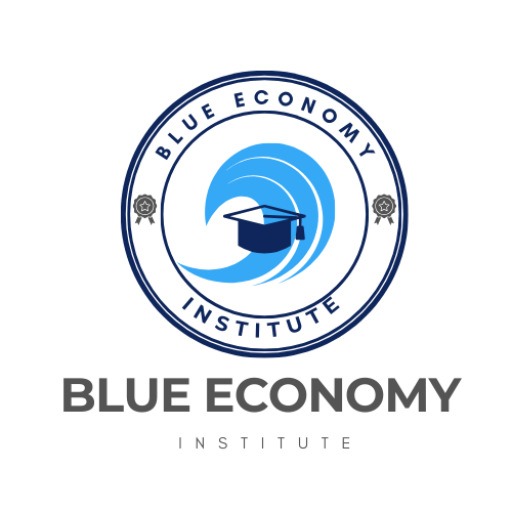RESEARCH PRIORITY AREAS AT THE BLUE
ECONOMY INSTITUTE
Marine Ecosystem Conservation
Focus:
Biodiversity: Study and protect marine biodiversity, including endangered species and critical habitats.
Ecosystem Services: Assess the services provided by marine ecosystems, such as carbon sequestration and water purification.
Habitat Restoration: Develop and implement strategies for the restoration and preservation of coral reefs, mangroves, and seagrass beds.
Goals:
Enhance understanding of marine ecosystems and their health. Develop conservation practices that mitigate human impact and promote biodiversity.
Sustainable Maritime Resource Management
Focus:
Fisheries Management: Research sustainable practices for managing fisheries, reducing overfishing, and ensuring stock recovery.
Aquaculture: Investigate sustainable aquaculture techniques and their impact on marine environments.
Marine Spatial Planning: Develop frameworks for the spatial management of marine resources to balance conservation and economic activities.
Goals:
Promote sustainable use of marine resources.
Develop policies and practices that balance ecological health with economic benefits.
Climate Change and Ocean Dynamics
Focus:
Climate Impact: Study the effects of climate change on marine environments, including sea-level rise and ocean acidification.
Ocean Circulation: Research ocean currents, heat distribution, and their impact on global climate patterns.
Adaptation Strategies: Develop strategies for mitigating and adapting to climate change effects on marine and coastal communities.
Goals:
Understand and predict the impacts of climate change on marine systems.
Create adaptive strategies to manage climate-related challenges.
Maritime Safety and Risk Management
Focus:
Safety Protocols: Develop and refine safety protocols for maritime operations, including navigation and emergency response.
Risk Assessment: Assess and mitigate risks associated with maritime transportation, including accidents and environmental hazards.
Technology Integration: Explore the use of advanced technologies for enhancing maritime safety.
Goals:
Improve safety standards and risk management in maritime operations.
Enhance the resilience of maritime systems to potential hazards.
Blue Economy Policy and Governance
Focus:
Policy Development: Research policies and regulatory frameworks that support sustainable development in the blue economy.
Governance Models: Study different governance models for managing marine resources and ensuring stakeholder engagement.
Economic Analysis: Analyze the economic impacts of blue economy activities and develop strategies for promoting sustainable growth.
Goals:
Inform policy-making with evidence-based research. Promote effective governance and sustainable economic development.
Innovation and Technology in Marine Industries
Focus:
Marine Technology: Develop and assess new technologies for marine exploration, monitoring, and resource management.
Renewable Energy: Research innovative solutions for marine renewable energy sources, such as offshore wind and wave energy.
Data Analytics: Utilize data analytics and modeling to enhance decision-making and efficiency in marine industries.
Goals:
Foster technological innovation that supports the blue economy. Improve efficiency and sustainability through advanced technologies.
Socio-Economic Impacts of Marine Activities
Focus:
Community Impact: Study the socio-economic impacts of marine activities on coastal and island communities.
Cultural Heritage: Research the cultural and historical significance of marine environments and their impact on local traditions and livelihoods.
Public Engagement: Explore strategies for engaging the public and stakeholders in marine conservation and sustainable practices.
Goals:
Understand and address the socio-economic dimensions of marine activities. Promote inclusive and equitable development in coastal communities.
Education and Capacity Building
Focus:
Training Programs: Develop educational programs and training modules to build capacity in marine and blue economy sectors.
Knowledge Transfer: Facilitate the transfer of knowledge and best practices to practitioners, policymakers, and communities.
Collaborative Research: Encourage collaborative research initiatives with academic institutions, industry partners, and international organizations.
Goals:
Enhance the skills and knowledge of individuals and organizations involved in the blue economy.
Foster collaboration and innovation through education and research partnerships.
